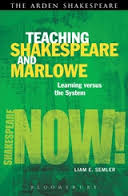 I like to keep an eye on Bloomsbury’s Shakespeare Now! series, in which I published At the Bottom of Shakespeare’s Ocean in 2009. Co-editors Ewan Fernie and Simon Palfrey have built a wonderfully varied series, with eight books in the “first wave,” including mine, and five and counting in the still-cresting “Second Wave.” I picked up the latest one, Liam Semler’s Teaching Shakespeare and Marlowe: Learning versus the System when I was in Stratford last week. Who knew a book on education policy, among other things, could be so much fun?
I like to keep an eye on Bloomsbury’s Shakespeare Now! series, in which I published At the Bottom of Shakespeare’s Ocean in 2009. Co-editors Ewan Fernie and Simon Palfrey have built a wonderfully varied series, with eight books in the “first wave,” including mine, and five and counting in the still-cresting “Second Wave.” I picked up the latest one, Liam Semler’s Teaching Shakespeare and Marlowe: Learning versus the System when I was in Stratford last week. Who knew a book on education policy, among other things, could be so much fun?
Semler starts with two striking images of the pedagogical relationship: Hubert in Shakespeare’s King John, who’s given the task of putting out the eyes of Arthur, possible heir to the throne. That makes him a bad teacher, but perhaps also symptomatic. The second example is Marlowe’s Faustus, who wants to o’erleap all systems. I knew I was in good hands when the prose got aphoristic:
Education is a type of eye surgery (3).
Throughout the short book, certain phrases catch you sideways, unaware, with the suddenness of insight. A short review might work best just by glossing a few.
Formulae are systems’ teeth (13).
The book’s core argument explores an inevitable tension between “systems,” particularly educational / administrative systems that seek compliance and clarity, and the blazing surprises of humanist education. Semler doesn’t want to overturn the system entirely, just throw some aesthetic and stressful sand into its gears.
[T]he exam [too] may be beautiful (34).
He dreams and partly institutionalizes, inside and beyond particular classrooms at the U of Sydney, an “ardenspace” modeled on As You Like It that supplements and challenges administrative mastery.
Ardenspace is a type of dreaming (53).
It is also a type of dreaming that attracts ARC funding, at least for a while.
Semler builds new sub-systems because
The grinding sounds of system stress are what I live for (63).
My favorite part of the book comes when he re-imagines an upper-level Marlowe course with a more radical imperative:
It was time to burn it down (86).
In class in 2011 I declared Marlowe a vampire (117).
Shame is the big, silent brother of assessment (93).
Our language is always tainted by machine language (129).
There’s no final victory in a pedagogical war like this one, but Semler fights the good fight, and, I have no doubt, claims triumphs for his students and edu-landscape in Sydney.
It’s a smart, lively book, and I’m especially impressed by his creative engagement with the realities of the modern academic landscape. A book for all of us semi-experimental pedagogues!
Leave a Reply